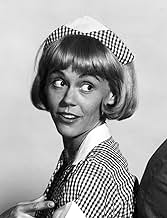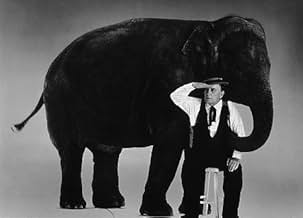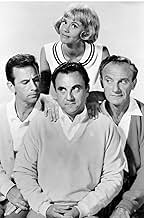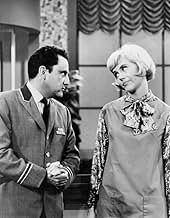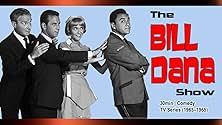This NBC spinoff of "The Danny Thomas Show" featured the character of Jose Jiminez, a nasally sounding Latin American bellhop at a New York hotel.This NBC spinoff of "The Danny Thomas Show" featured the character of Jose Jiminez, a nasally sounding Latin American bellhop at a New York hotel.This NBC spinoff of "The Danny Thomas Show" featured the character of Jose Jiminez, a nasally sounding Latin American bellhop at a New York hotel.
- Nominated for 1 Primetime Emmy
- 1 nomination total
Browse episodes
Storyline
Did you know
- ConnectionsFeatured in Never Fear Smith Is Here! (1994)
Featured review
The term "Déjà vu" means a feeling that you have seen something before as you are watching it happen, now. And I have to say this series is the one that best sums up that phrase, for me.
Let's start with a basic fact. Bill Dana created a character that he was associated with for the bulk of his career. This character was first introduced to a national audience on "The Steve Allen Show," a kind of prime time spinoff of NBC's "The Tonight Show," which Allen also hosted at that time.
Dana's character, José Jiménez, got to be quite popular and landed an occasional appearance on "The Danny Thomas Show," where he was an elevator operator who dealt with the ups and downs of that job.
Eventually, the character became so popular, he even got one of the famed "window cameos" during a "bat-climb" on the 1966 Adam West series "Batman." But between Danny and The Bat, we had this series. It was the Autumn of 1963 and the Elevator Operator character got promoted to bellhop of a swank NYC hotel.
It's important to note that some people found Dana's characterization of this character offensive (Bill Dana's birth name was William Szathmary, and he was a Hungarian Jew, not Hispanic). But aside from a few malapropisms and an occasional mixed pronunciation of certain words, the character was intelligent, hard-working, honest and kind.
One of the co-stars that the Jiménez character had to answer to was the inept and staccato-speaking house detective, Mr. Glick, played by Don Adams.
Dana wrote comedy bits for Adams to perform on the show. And, as it turned out, when this series ended, Adams took the character of Mr. Glick (and clearly his dialog!) to Mel Brooks and Buck Henry and they created an even more inept spy to parody James Bond and the others on the scene at the time: "Get Smart."
Meanwhile, the other antagonist for Dana's bellman was the manager of the hotel, the booming, pedantic, and always annoyed Mr. Phillips, portrayed by Jonathan Harris. That character was the clear template for Dr. Zachary Smith from the sci-fi series "Lost In Space."
Those three characters: Jiménez, Glick and Phillips gave those three actors their careers!
The show's opening titles featured a cartoon avatar of Dana, with a photograph of his head, wearing a suit of armor, carrying a lance and riding a horse toward a windmill, a clear reference to the character of Don Quixote. Jiménez was a daydreamer, and would often imagine himself as someone important or famous, much like another character with an overactive imagination: Walter Mitty.
New York played a part because a big hotel always has important people coming through, new intrigue and always something for José fantasize about, plus, the stock responses of those aforementioned characters assured that there would be some interesting reactions to whatever was going on in and around their lodging.
I think this series provided a sort of comfort for viewers, in that they knew how the characters would respond to the circumstances and that knowledge provided a familiarity to how they received the situations.
Conversely, I think too many stock characters ruins the broth, and that's what you had here, before they all headed to their own shows. But, for one, brief shining moment, you had Dr. Smith shouting down Agent 86, and that has made all the difference.
Let's start with a basic fact. Bill Dana created a character that he was associated with for the bulk of his career. This character was first introduced to a national audience on "The Steve Allen Show," a kind of prime time spinoff of NBC's "The Tonight Show," which Allen also hosted at that time.
Dana's character, José Jiménez, got to be quite popular and landed an occasional appearance on "The Danny Thomas Show," where he was an elevator operator who dealt with the ups and downs of that job.
Eventually, the character became so popular, he even got one of the famed "window cameos" during a "bat-climb" on the 1966 Adam West series "Batman." But between Danny and The Bat, we had this series. It was the Autumn of 1963 and the Elevator Operator character got promoted to bellhop of a swank NYC hotel.
It's important to note that some people found Dana's characterization of this character offensive (Bill Dana's birth name was William Szathmary, and he was a Hungarian Jew, not Hispanic). But aside from a few malapropisms and an occasional mixed pronunciation of certain words, the character was intelligent, hard-working, honest and kind.
One of the co-stars that the Jiménez character had to answer to was the inept and staccato-speaking house detective, Mr. Glick, played by Don Adams.
Dana wrote comedy bits for Adams to perform on the show. And, as it turned out, when this series ended, Adams took the character of Mr. Glick (and clearly his dialog!) to Mel Brooks and Buck Henry and they created an even more inept spy to parody James Bond and the others on the scene at the time: "Get Smart."
Meanwhile, the other antagonist for Dana's bellman was the manager of the hotel, the booming, pedantic, and always annoyed Mr. Phillips, portrayed by Jonathan Harris. That character was the clear template for Dr. Zachary Smith from the sci-fi series "Lost In Space."
Those three characters: Jiménez, Glick and Phillips gave those three actors their careers!
The show's opening titles featured a cartoon avatar of Dana, with a photograph of his head, wearing a suit of armor, carrying a lance and riding a horse toward a windmill, a clear reference to the character of Don Quixote. Jiménez was a daydreamer, and would often imagine himself as someone important or famous, much like another character with an overactive imagination: Walter Mitty.
New York played a part because a big hotel always has important people coming through, new intrigue and always something for José fantasize about, plus, the stock responses of those aforementioned characters assured that there would be some interesting reactions to whatever was going on in and around their lodging.
I think this series provided a sort of comfort for viewers, in that they knew how the characters would respond to the circumstances and that knowledge provided a familiarity to how they received the situations.
Conversely, I think too many stock characters ruins the broth, and that's what you had here, before they all headed to their own shows. But, for one, brief shining moment, you had Dr. Smith shouting down Agent 86, and that has made all the difference.
- How many seasons does The Bill Dana Show have?Powered by Alexa
Details
- Runtime30 minutes
- Color
- Sound mix
- Aspect ratio
- 1.33 : 1
Contribute to this page
Suggest an edit or add missing content


